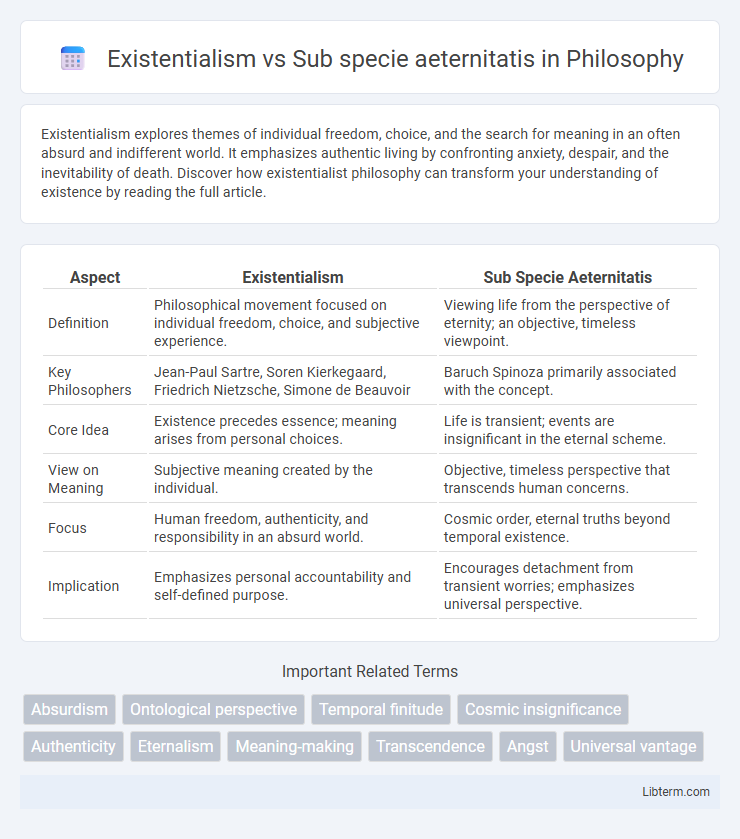Existentialism explores themes of individual freedom, choice, and the search for meaning in an often absurd and indifferent world. It emphasizes authentic living by confronting anxiety, despair, and the inevitability of death. Discover how existentialist philosophy can transform your understanding of existence by reading the full article.
Table of Comparison
| Aspect | Existentialism | Sub Specie Aeternitatis |
|---|---|---|
| Definition | Philosophical movement focused on individual freedom, choice, and subjective experience. | Viewing life from the perspective of eternity; an objective, timeless viewpoint. |
| Key Philosophers | Jean-Paul Sartre, Soren Kierkegaard, Friedrich Nietzsche, Simone de Beauvoir | Baruch Spinoza primarily associated with the concept. |
| Core Idea | Existence precedes essence; meaning arises from personal choices. | Life is transient; events are insignificant in the eternal scheme. |
| View on Meaning | Subjective meaning created by the individual. | Objective, timeless perspective that transcends human concerns. |
| Focus | Human freedom, authenticity, and responsibility in an absurd world. | Cosmic order, eternal truths beyond temporal existence. |
| Implication | Emphasizes personal accountability and self-defined purpose. | Encourages detachment from transient worries; emphasizes universal perspective. |
Defining Existentialism: Core Principles and Thinkers
Existentialism centers on individual freedom, choice, and subjective experience, emphasizing authentic existence in an absurd world. Key philosophers such as Jean-Paul Sartre, Soren Kierkegaard, and Friedrich Nietzsche explore themes of angst, despair, and the search for meaning. Sub specie aeternitatis, a concept from Spinoza, contrasts this by viewing reality from the "perspective of eternity," highlighting a universal, deterministic viewpoint beyond personal existence.
Understanding Sub Specie Aeternitatis: The View from Eternity
Sub specie aeternitatis, a Latin phrase meaning "from the perspective of eternity," represents an objective viewpoint where events and entities are considered timelessly and universally, detached from subjective human experience. This perspective contrasts with existentialism, which centers on individual existence, choice, and subjective meaning-making within temporal life. Understanding sub specie aeternitatis deepens comprehension of philosophical discussions on the nature of reality, providing insight into how eternal truths coexist with human temporality.
Historical Origins: From Kierkegaard to Spinoza
Existentialism originated with Soren Kierkegaard's 19th-century emphasis on individual human experience and subjective truth, contrasting sharply with Benedictus de Spinoza's 17th-century philosophy of sub specie aeternitatis, which viewed existence from the perspective of eternity and universal order. Kierkegaard's focus on personal angst and freedom challenged Spinoza's deterministic worldview grounded in God or Nature as an infinite, eternal substance. This historical divergence highlights the existentialist commitment to individual meaning against Spinoza's impersonal, eternal perspective on reality.
Human Existence: Subjectivity vs. Cosmic Perspective
Existentialism emphasizes individual human existence, freedom, and subjective experience as the foundation of meaning, underscoring personal choice and responsibility. Sub specie aeternitatis, a concept rooted in Stoicism and philosophy, promotes viewing life from a cosmic or eternal perspective, where human affairs are understood as part of an impersonal, vast universe. The tension lies between existentialism's focus on subjective reality and the cosmic viewpoint's detachment, highlighting contrasting interpretations of significance and purpose in human life.
Freedom, Anxiety, and Meaning in Existentialism
Existentialism emphasizes individual freedom as the cornerstone of human existence, where each person must create their own meaning despite inherent anxiety and absurdity. Freedom in existentialism is both empowering and burdensome, generating existential anxiety from the responsibility to choose authentically. Unlike the detached, eternal perspective of sub specie aeternitatis, existentialism grounds meaning in subjective experience, highlighting the tension between freedom, anxiety, and the quest for purpose.
Detachment and Objectivity in Sub Specie Aeternitatis
Sub specie aeternitatis emphasizes detachment by encouraging individuals to view life and events from an eternal, objective perspective beyond personal biases. This viewpoint contrasts with existentialism's focus on subjective experience and individual meaning-making, highlighting a universal, dispassionate understanding of existence. The detachment inherent in sub specie aeternitatis fosters objectivity by transcending temporal and emotional limitations, allowing for an impartial assessment of reality.
Personal Responsibility vs. Universal Indifference
Existentialism emphasizes personal responsibility, asserting that individuals must create their own meaning and navigate life's inherent freedom and anxiety. Sub specie aeternitatis, or viewing life from the perspective of eternity, suggests a universal indifference where individual actions appear insignificant against the vast, timeless cosmos. The tension arises as existentialism calls for authentic engagement despite the perceived cosmic insignificance highlighted by sub specie aeternitatis.
The Role of Death and Mortality in Both Worldviews
Existentialism confronts death as an undeniable boundary that shapes human freedom and meaning, emphasizing individual authenticity amid mortality. Sub specie aeternitatis, viewing life from the perspective of eternity, approaches death as a transient event within an infinite temporal framework, diminishing its existential urgency. Both worldviews address mortality, but existentialism highlights personal confrontation with finitude, while sub specie aeternitatis situates death within a timeless, cosmic context.
Ethical Implications: Living Authentically or Universally?
Existentialism emphasizes living authentically by making individual choices that create personal meaning, highlighting the ethical responsibility of self-defined values. Sub specie aeternitatis, or viewing life from the perspective of eternity, promotes ethical implications rooted in universal, timeless truths that transcend subjective experience. The tension lies in whether morality arises from personal authenticity or objective, eternal principles guiding ethical behavior.
Reconciling Existentialism with the Eternal Perspective
Existentialism emphasizes individual freedom, choice, and the creation of meaning within a finite human life, while Sub specie aeternitatis offers a timeless, cosmic perspective that views events from the standpoint of eternity. Reconciling these views involves acknowledging existential freedom and subjective meaning-making as valid within the broader, impersonal framework of eternity. Integrating these perspectives encourages a balanced understanding where human experiences gain profound significance without negating the vast, eternal context of existence.
Existentialism Infographic

 libterm.com
libterm.com